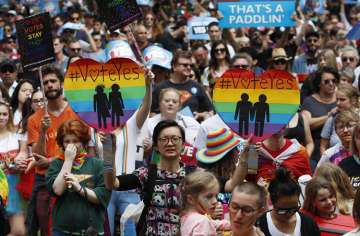Australians say 'yes' to same-sex marriage in historic vote, PM Turnbull promises law by Christmas
62 percent of registered adults who voted in the polls supported same-sex marriage, ensuring that the Parliament considers a bill to legalise marriage equality this year.

Australians have overwhelmingly voted in favour of legalising same-sex marriage in a historic non-binding postal survey that ensures the Parliament considers a bill to legalise marriage equality this year.
The Australian Bureau of Statistics said on Wednesday that almost 62 percent of registered adults who responded had voted in for the reform to allow same-sex couples to wed.
More than 12.7 million people -- about 79.5 per cent of 16 million registered voters -- took part in the an unprecedented two-month postal survey.
Prime Minister Malcolm Turnbull said the "overwhelming" result meant his government would aim to change the law in parliament before Christmas.
"The people of Australia have spoken and I intend to make their wish the law of the land by Christmas. This is an overwhelming call for marriage equality," he said after the result was announced.
"They voted yes for fairness, yes for commitment, yes for love. And now it is up to us here in the parliament of Australia to get on with it."
Supporters began celebrating the result in public spaces across Australia on Wednesday, waving rainbow flags and singing and dancing.
The conservative government had promised to allow the Parliament to consider a bill to create marriage equality in Australia in its final two-week session that is due to end on December. 7.
While gay marriage could be a reality in Australia by Christmas, some government lawmakers have vowed to vote down gay marriage regardless of the survey's outcome.
Opponents have also questions the legitimacy of any same-sex marriage law since several lawmakers could potentially be disqualified from Parliament due to a constitutional ban on dual citizens standing for election.
Ireland is the only other country in the world to put the divisive issue to a popular vote.
In Ireland, 61 percent of registered voters turned out for a referendum in 2015 and 62 percent of those voted to change the constitution to allow marriage equality.
In Australia, almost 80 percent of voters supported gay-marriage, despite opponents describing it as a boutique issue that did not interest most of the public.
Gay rights advocates had opposed the non-binding 100 million Australian dollar ($76 million) survey as an unnecessary obstacle to achieving equality.
The Senate had refused to fund a compulsory vote, however, so the government opted for a voluntary postal ballot. Critics said it was unlikely to accurately reflect public opinion.
The United Nations Human Rights Committee last week criticized Australia for putting gays and lesbians "through an unnecessary and divisive public opinion poll." The committee called on Australia to legislate for marriage equality regardless of the survey's outcome.
In 2015, then-Prime Minister Tony Abbott, a high-profile same-sex marriage opponent, committed his conservative government to holding a compulsory nationwide vote to decide whether the unions should be legal.
Abbott welcomed the survey saying that the parliament should "respect the result".
"I always said this was an issue where the Australian people wanted their say and today's result demonstrates that seeking their views was the right thing to do," he wrote on Facebook.
He was once head-butted by a gay rights advocate during the campaign in September.
Abbott was replaced by current Turnbull, who supports marriage equality and opposed the public vote but eventually agreed to it in a deal with party powerbrokers. He is facing debate within his government over what the parliamentary bill should include.
Australian lawmakers are already moving to wind back anti-discrimination laws to reduce barriers for people who would boycott gay weddings.
Debate is intensifying on whether Australians who would refuse to provide gay weddings with a celebrant, venue, flowers or a cake should have added protection against anti-discrimination laws.
Some conservative MPs are pushing for the bill to include exemptions that would allow businesses opposed to same-sex marriage to refuse goods and services for weddings.
Several government lawmakers on Monday released a draft gay marriage bill that critics argue would diminish current protections for gays against discrimination on the grounds of sexuality.
Turnbull on Tuesday ruled out downgrading anti-discrimination laws.
(With agencies)